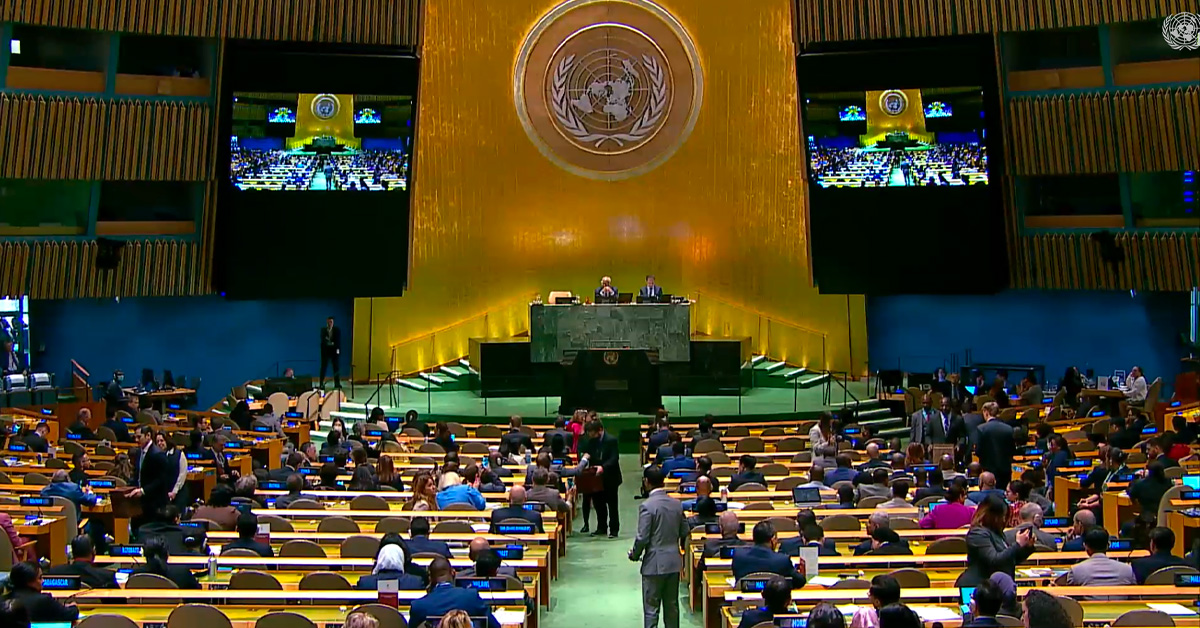The Saudi regime, a notorious perpetrator of human rights violations, will not have a seat at the United Nations Human Rights Council after it was denied by States at the UN General Assembly.
Member States voted today to elect 18 new members to the Council, picking from 19 candidates (full results below) running in five separate regional slates (see the full list of candidates below). Of these, four were uncompetitive, and only the Asia-Pacific slate had more candidates (6) than seats available (5): running in this slate, Saudi Arabia came in sixth with 117 votes, behind the Marshall Islands (124), the Republic of Korea (161), Cyprus (167), Qatar (167), and Thailand (177).
Saudi Arabia, a brazen perpetrator of human rights violations should not be allowed to sit at the Human Rights Council. We are relieved that enough States took their record on human rights into account when voting. Saudi Arabia's record is a laundry list of the kinds of abuses the Council should seek to address: from atrocity crimes, to the repression of civil society and criminalisation of women human rights defenders, both in and outside its borders.
Madeleine Sinclair, director of ISHR’s New York office
Prior to the vote, ISHR campaigned for States to use their vote to ensure the Council consists of members that are principled actors on preserving human rights globally, as per the body’s own mandate and membership criteria. Based on these criteria, ISHR produced a series of individual and regional scorecards examining the records of all 19 candidates running this year, which clearly showed Saudi Arabia was wholly unfit to be elected.
In January this year, the Kingdom’s human rights record was examined by its peers at the UN’s Universal Periodic Review (UPR), during which a range of States sought answers for reported systemic violations of basic rights, including against foreign and migrant workers, and on gender-based violence, only to be rebutted by Saudi representatives who later ignored substantial recommendations for reform. In late March, running unopposed, Saudi Arabia was shockingly elected to chair the UN’s Commission on the Status of Women (CSW), despite the country’s notorious disregard for women’s rights.
Today’s vote underscores the power of competitive elections at the UN, though we regret that only one regional group put forward more candidates than there were vacant seats. For the third year in a row, when given a real choice, States voted down the less deserving candidate, refusing to hand powerful actors who violate basic rights an enhanced ability to bend key human rights processes in their favour.
Tess McEvoy, ISHR Programme Director
Recent elections with competitive slates have resulted in the successive defeats of Venezuela and Russia, which both lost their bids to remain in or return to the Council in competitive elections, in 2022 and 2023 respectively.
However, since they first took place in 2007, Human Rights Council elections have frequently been uncompetitive, with few open contests in regional groups. States have put forward closed slates across all regions on four occasions (2008, 2009, 2018 and 2021), while most other elections have only involved one (2010, 2012, 2020, 2024) or two competitive slates (2011, 2013, 2014, 2015, 2016, 2017, 2019, 2022 and 2023) at a time.
ISHR urges States with strong human rights records and which are genuinely committed to advancing human rights to stand for elections and avoid presenting clean slates in UN bodies, to keep these elections competitive and to ensure entities like the Council are effective and principled.
The full results of the 2024 Human Rights Council elections are as follows:
- African States (closed slate): Benin (181 votes), Gambia (181), Kenya (181), Democratic Republic of the Congo (172), Ethiopia (171), and Liberia (write-in, 1 vote)
- Asia and the Pacific States (competitive slate): Thailand (177), Cyprus(167), Qatar (167), Republic of Korea(161), and Marshall Islands (124)
- Latin America and Caribbean States (closed slate): Bolivia (180), Colombia (175) and Mexico (172), Ecuador (write-in, 1) and Saint Lucia (write-in, 1)
- Western Europe and other States (closed slate): Switzerland (175), Iceland (174) and Spain (174)
- Central and Eastern Europe States (closed slate):North Macedonia (168) and Czechia (166)

